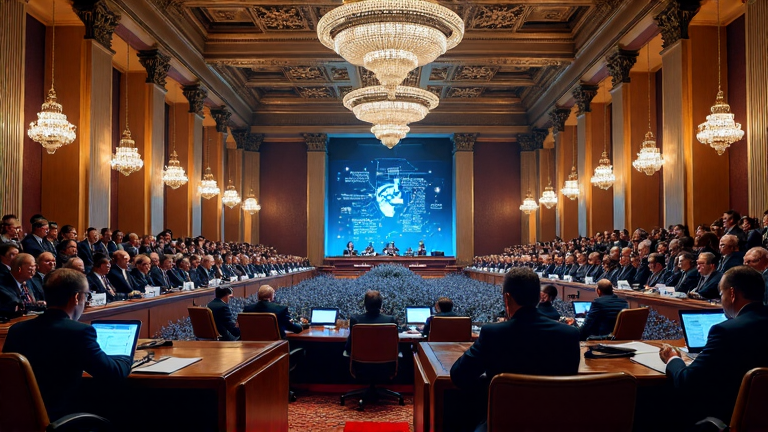
Global Leaders Forge a Path for Ethical AI Under Sovereign Control
In a monumental gathering at Paris’s Grand Palais, approximately 1,500 guests convened over two days to deliberate the future of artificial intelligence. Co-hosted by French President Emmanuel Macron and Indian Prime Minister Narendra Modi, the summit aimed to establish a global framework for AI governance that emphasizes ethical, accessible, and cost-effective technology. European sovereignty over AI also featured prominently on the agenda.
Highlights of the Summit
-
Diverse Participation: The event brought together political heavyweights and tech industry pioneers. Notable figures such as US Vice President JD Vance, Chinese Vice Premier Zhang Guoqing, OpenAI CEO Sam Altman, and Google CEO Sundar Pichai engaged in discussions through lectures and panels.
-
Investment and Innovation: Macron recently highlighted France’s ambitious plan to secure 109 billion euros in AI investments from a mix of sources including the United Arab Emirates, major American and Canadian funds, and French enterprises. This initiative, likened to the US $500-billion "Stargate" AI program led by OpenAI, underscores France's commitment to remaining competitive in the global AI arena.
-
Technological and Economic Imperatives: The summit illuminated the growing challenges nations face in keeping pace with rapid technological advancements. Chinese startup DeepSeek’s breakthrough in low-cost, high-performance AI models and the US push under the "Stargate" project to build state-of-the-art data centers illustrate the global race toward advanced AI infrastructure.
-
European Strategic Initiatives: Amid concerns over technological dependence, voices like Sylvain Duranton of the Boston Consulting Group called for Europe to assert control and leadership in AI development. In line with this, European Commission President Ursula von der Leyen is set to unveil plans for approximately 10 public supercomputers, encouraging research and innovation among startups and academic circles.
The Push for Global Governance
Beyond investment strategies, the summit also saw a major announcement from a consortium of countries, companies, and philanthropic organizations. They committed $400 million to launch "Current AI," a partnership dedicated to:
- Providing AI developers with broader access to data
- Offering open-source tools and infrastructure
- Creating systems to assess AI’s social and environmental impact
Martin Tisne, founder of Current AI, emphasized the duality of AI technology—its transformative potential and the risks of unchecked development. This initiative is part of a broader effort to align technology with public interest.
Looking Ahead
A plenary session scheduled for Tuesday, involving leaders from around 100 nations, including Modi, Vance, Zhang, and Von der Leyen, will focus on voluntary commitments to ensure that AI development is both sustainable and environmentally conscious. While the prospect of a unified global stance on AI regulation remains uncertain, especially given the varied priorities of the European Union, United States, China, and India, the summit has set the stage for unprecedented international dialogue on AI’s future.
Note: This publication was rewritten using AI. The content was based on the original source linked above.